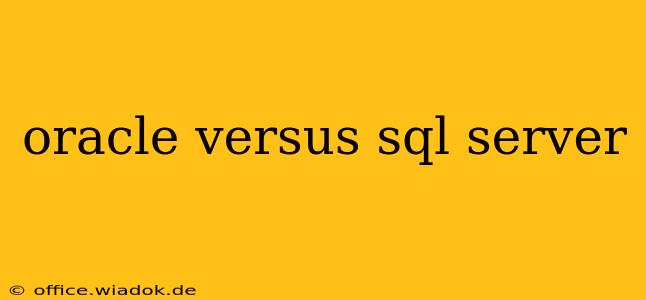Choosing the right database management system (DBMS) is a critical decision for any organization, impacting everything from application performance and scalability to security and cost. This in-depth comparison of Oracle and SQL Server will help you understand the strengths and weaknesses of each, enabling you to make an informed choice based on your specific requirements.
Key Differences: A Head-to-Head Comparison
Both Oracle and SQL Server are powerful relational database management systems (RDBMS) with extensive feature sets, but they cater to different needs and priorities. Here's a breakdown of their key differences:
1. Cost and Licensing
- Oracle: Known for its complex and often expensive licensing model. Costs can significantly escalate with increasing user numbers and storage capacity. Maintenance fees also contribute to the overall expenditure.
- SQL Server: Generally offers a more affordable licensing model, particularly for smaller organizations. Licensing options vary depending on the edition (e.g., Express, Standard, Enterprise) and the specific features required. Microsoft's cloud offerings (Azure SQL Database) provide further cost-effective alternatives.
2. Performance and Scalability
- Oracle: Renowned for its high performance and exceptional scalability, particularly for large, complex databases. Its advanced features, like RAC (Real Application Clusters) and Data Guard, offer robust high availability and disaster recovery capabilities.
- SQL Server: Provides strong performance and scalability, suitable for a wide range of applications. While it might not match Oracle's capabilities at the very highest end of enterprise-scale deployments, its performance is generally excellent for most businesses. SQL Server's integration with other Microsoft technologies can also enhance performance in specific scenarios.
3. Features and Functionality
Both databases offer a rich feature set, including:
- Relational database functionality: Both support standard SQL, ACID properties, and common database features like stored procedures, triggers, and views.
- Advanced features: Both offer advanced analytics capabilities (Oracle's Analytical Workspace Manager, SQL Server's Analysis Services), in-memory processing, and JSON support.
- Security: Both provide robust security features, including encryption, access control, and auditing. However, the specifics and ease of implementation can differ.
However, subtle differences exist:
- Oracle's advanced features: Oracle often boasts more mature and advanced features in areas like data warehousing and high-availability clustering.
- SQL Server's integration: SQL Server benefits from seamless integration within the Microsoft ecosystem, offering tighter integration with other Microsoft products like .NET, Active Directory, and Azure.
4. Community and Support
- Oracle: Has a large and active community, but support can be costly, especially for the more specialized features.
- SQL Server: Benefits from a large and well-supported community, with extensive online resources and readily available assistance. Microsoft offers various support options, ranging from community forums to premium support packages.
5. Platform Support
- Oracle: Runs on a wider range of operating systems and hardware platforms compared to SQL Server.
- SQL Server: Primarily runs on Windows, although Linux support is available. This tighter integration with the Windows ecosystem can be advantageous for organizations heavily invested in the Microsoft stack.
Choosing the Right Database: Considerations
The best choice between Oracle and SQL Server depends on several factors:
- Budget: SQL Server often presents a more budget-friendly option, especially for smaller organizations.
- Scale and performance requirements: For extremely large and complex databases requiring maximum performance and scalability, Oracle might be preferable.
- Existing infrastructure: Organizations already heavily invested in the Microsoft ecosystem will likely find SQL Server to be a more natural fit.
- Expertise and support: Consider the availability of skilled personnel and the cost of support services.
- Specific application requirements: Certain applications might have better compatibility or integration with one database system over the other.
Conclusion: No One-Size-Fits-All Solution
Ultimately, there's no universally superior database. Oracle and SQL Server both excel in different areas. Careful consideration of your specific needs, budget, and technical capabilities is crucial for making the right decision. Consult with database experts to thoroughly assess your requirements and determine which DBMS will best support your long-term goals.

